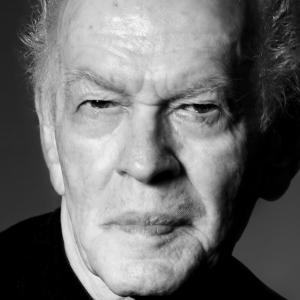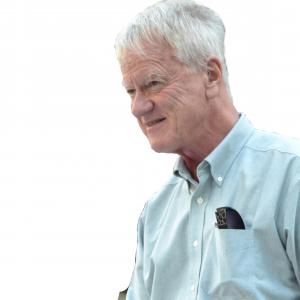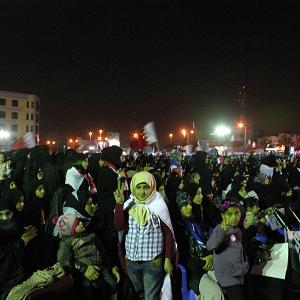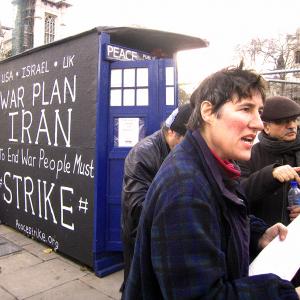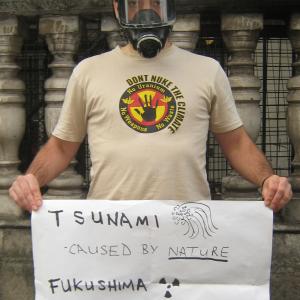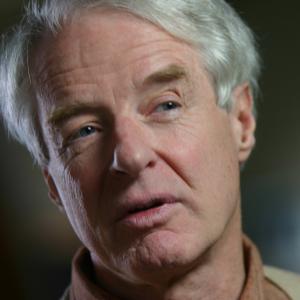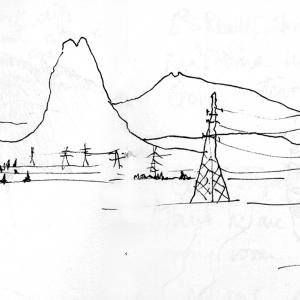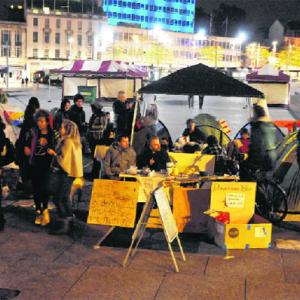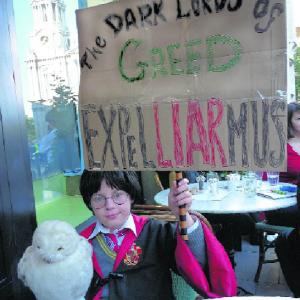Shamsia, 23, is a graffiti artist in Kabul, Afghanistan. She learned graffiti in December 2010 at a workshop by Combat Communications: ‘I was used to working with paints on canvasses but when I used a spray can for the first time and worked on a big wall it was exciting and cool and such an achievement. I wanted to do something about women’s rights in Afghanistan and the burqa, but in an ironic way and take the idea of the burqa away from how we are used to seeing it.
Image…Features
Gene Sharp. PHOTO: Conor Doherty
Arguably the best-known advocate of nonviolence working today, through books such as 1993’s 'From Dictatorship to Democracy', Gene Sharp has influenced popular revolutions and revolts across the globe. He was interviewed by Ian Sinclair for PN.
Peace News: When and why did you first get interested in the serious study of nonviolent struggle?
Gene Sharp: Well, the world was in a bit of a mess [after the Second World War], and I began to learn…
George Lakey gets arrested ...
George has stood up for radical nonviolence for decades. He persuaded PN to adopt the slogan ‘for nonviolent revolution’ in 1969. George was a co-founder of two important US radical institutions, the Movement for a New Society and Training for Change, he has led 1,500 workshops around the world.
George will be touring the UK and attending the entire five days of Peace News Summer Camp (26-30 July), where he will lead several sessions.
To be kept…
George Lakey
While many of us are working to ensure that the Occupy movement will have a lasting impact, it’s worthwhile to consider other countries where masses of people succeeded in nonviolently bringing about a high degree of democracy and economic justice. Sweden and Norway, for example, both experienced a major power shift in the 1930s after prolonged nonviolent struggle. They ‘fired’ the top 1% of people who set the direction for society and created the basis for something…
One of the nightly mass rallies in Freedom Square, Manama, Bahrain,
February 2012. PHOTO: K. Flo Razowsky
I have just arrived back in the US after being arrested and deported from the Kingdom of Bahrain. I was forced into an unmarked car by uniformed officers as I photographed a small, nonviolent protest march and the police’s violent response.
The march at which I was arrested was headed for LuLu Square, or Pearl Roundabout as it is known, the birthplace of this most recent…
Deborah Glass-Woodin
Deborah Glass-Woodin was an active member of the Green Party and served on the city and county council in Oxford, where she still lives. Deborah had her pre-trial hearing on 2 February and her full hearing is scheduled for 14 May at Reading magistrates’ court.
After spending many years as an active member of the Green Party, she has become a green activist. In 2008, she was arrested during a protest against treefelling in Oxford. The charges were later…
Father Bill ‘Bix’ Bichsel, 83, recidivist peace activist, was imprisoned (for three months) for trespassing at the Y12 nuclear weapons complex in Oak Ridge, Tennessee. Bix left prison on 9 February (having completed 19 days of fasting against ‘nuclear weapons, inhumane treatment at prisons and the separation of policy from conscience’). This picture by cartoonist and inventor RR Anderson (from Bix’s home town, Tacoma) is of a Tacoma Action Figure: ‘REAL ULTIMATE American Hero Bix…
Image by Emily Johns
From January to March 1912, women led a successful strike of 25,000 textile workers in Lawrence, Massachusetts, USA. The phrase ‘bread and roses’ was coined to represent the struggle for quality of life as well as wages. See more on the Bread and Roses Centennial website.
Medea Benjamin. PHOTO: Code Pink
PN: What have been the main achievements of the US peace movement since 11 September 2001?
MB: Successes? We moved public opinion from being radically pro-war in the beginning – both in terms of attacking Afghanistan and Iraq – to being overwhelmingly anti-war within the first couple of years and made the war an issue during the presidential elections.
Building an anti-war movement that became…
John Tirman
Peace News: What is the main argument of your book, The Death of Others?
John Tirman: I am interested in two things. One is what happens to civilians during wartime. How many are killed? How many are displaced? Why does it happen? What is US policy towards civilians in wartime? The second part is about the American public reaction to high civilian mortality, and civilian misery in general.
PN: How…
Maria Gallastegui and fellow peace campers protesting against war on Iran or Syria at the Peace Strike camp in Parliament Square, on 19 January. PHOTO: Dan Viesnik
Long-time peace camper Maria Gallastegui, 53, has managed to stave off eviction from Parliament Square, despite the clearing of all other protest camps in the central London square.
Among other structures cleared, the peace camp set up by the late Brian Haw in 2001 was…
PN: What do you mean by capitalism, if you use the term, and what are the changes to our economic system that we should be demanding both now and in the medium term?
MB: In the context of the US it’s really not useful, and I would say detrimental, to speak in terms of capitalism, because it turns the majority of people off right away. We have such a reactionary population and such a lack of a broad spectrum of dialogue that even talking about socialism in the context of the United…
While a new poll in Afghanistan shows overwhelming support for negotiations with the Taliban, and a majority favouring a coalition government including the Taliban, future British strategy in the country is hard to judge.
Though UK officials have reportedly concluded that the Taliban are “too deep-rooted to be eradicated by military means”, they are still preparing to escalate the war next spring.
Afghans demand talksIn a cross-country poll of 1,578 Afghans, conducted in mid-…
Dan Viesnik outside the Japanese embassy, London, 2 November. One World, No Nukes delivered a petition to stop the shipping of contaminated rubble from Fukushima to Tokyo. PHOTO: Kick Nuclear
Post-Fukushima, did I hear you say? Eight months later, we should still be speaking of the Fukushima-Daiichi disaster in the present tense. After the earthquakes, after the tsunami, after the explosions, after the triple-meltdown, after the massive leaks…
PN: Judged by its impact on events, the anti-war movement played a fairly marginal role in the course of the First World War. Why have you chosen to foreground it in your history?
AH: I think traditionally people like to write books about movements that succeed, for example, the British anti-slavery movement which was the subject of my last book, but it seems to me that most movements that really matter fail a number…
Electricity pylon, Iran. DRAWING: Emily Johns
Threatening headlines in early November raised the prospect of Israeli and/or western military action against Iran; propaganda organised around the publication of a report on Iran’s nuclear power programme by the international atomic energy agency (IAEA) on 8 November.
While the IAEA report broke new rhetorical ground in declaring the UN agency’s “serious concerns” about “possible military dimensions to Iran’s nuclear programme”, it…
The website had asked people to assemble in front of St Paul’s cathedral at 12 noon precisely (“not early or late”), so of course everyone turned up at 11.45am, milling aimlessly with their banners. At noon a sound system was turned on, pumping out a furious electronic beat... and we continued to mill.
It was Saturday 15 October, and “Occupy London” were acting in solidarity with “Occupy Wall St”, initiated by Adbusters in New York on 17 September. The Wall St occupation, which is…
After recently reading Flat Earth News by Nick Davies about “churnalism”, distortion and propaganda in the global media, I thought hard about choosing the “Getting the most from the mainstream media” workshop at the Rebellious Media Conference, among all the opportunities at the RMC for learning about new (to me) ways of communicating for activists. As an anti-war activist not based in London, I feel that the local press and broadcasters still provide ways of getting the message out beyond…
Last year Matthew Alford published Reel Power: Hollywood cinema and American supremacy (Pluto Press), an analysis of mainstream US cinema’s representation of US foreign policy since 9/11. He discussed his book with Peace News at the Rebellious Media Conference.
PN: What is the main argument of Reel Power?
MA: That Hollywood films which depict American foreign policy have a very strong tendency to support notions of American “exceptionalism” and almost never criticise it at a…
By any means neccessary. Occupy activists use all forms of magic to oust evil at St Paul’s Cathedral
Here I am. Do I really need to do this? Well, yes. Why? Because in the end, it always comes down to the streets. When the greed, the hypocrisy, the assaults on our freedoms, our pockets, our future and our common sense go so far beyond the level of toleration, there’s no substitute for the outrage of the…



